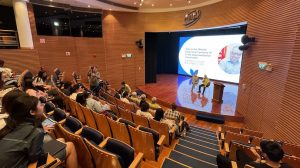Shopping mall operator Shenzhen Coastalcity Commercial Management Co., Ltd recently welcomed an undergraduate from IFT on a 6-month internship. The student, Kini Lin, from the Tourism Retail and Marketing Management bachelor degree programme, says the internship was an opportunity to gain professional experience in the Guangdong-Hong Kong-Macao Greater Bay Area, and to deepen her understanding of some of the differences between Shenzhen and Macao.
The mall firm operates Costal City, a shopping and office complex in Nanshan District, in Shenzhen, in Mainland China’s Guangdong Province. The metropolis is one of the 4 core cities covered by China’s development blueprint for the Greater Bay Area, as announced in February by the State Council. The other 3 are Macao, Hong Kong and Guangzhou.
“We now always talk about the Guangdong-Hong Kong-Macao Greater Bay Area,” Kini says. “I think having taken an internship in a company within the Greater Bay Area can provide me additional work opportunities in the future,” adds the IFT student. She plans to build her professional career within the Greater Bay Area city cluster, preferably either in Macao or Shenzhen.
The Greater Bay Area project encompasses the 2 Special Administrative Regions of the People’s Republic of China, namely Hong Kong SAR and Macao SAR; and 9 cities from Guangdong Province, namely Guangzhou, Shenzhen, Zhuhai, Foshan, Huizhou, Dongguan, Zhongshan, Jiangmen and Zhaoqing. It aims to advance and integrate development in the Greater Bay Area in several sectors, including the underlying economy and trade, environmental protection and education.
IFT has outlined that it fully supports those policies of the Macao SAR Government designed to facilitate and enhance the development of the Greater Bay Area. Its support includes promoting academic research on the coastal urban cluster initiative, backing student exchanges and internships involving other cities in the Greater Bay Area, and fostering regional collaboration in tourism education and training.
Kini says she decided to do her curricular internship at Shenzhen Coastalcity Commercial Management to gain professional experience of working in a shopping mall complex rather than at a single retail store.
“I was clear I wanted to have my internship in Shenzhen,” she recalls. “So I tried to contact some large shopping malls there.”
IFT students studying for a bachelor’s degree are required to do a 6-month internship in Year 3. They can opt for placements in Macao or elsewhere, such as in Mainland China, the United States, France or even the Maldives.
Kini did her internship in the first semester of the 2018/19 academic year. She was placed in the planning department at Shenzhen Coastalcity Commercial Management, where she became familiar with some of the differences between Macao and Shenzhen in terms of retail management.
One of the issues she highlights relates to promotional planning. “Companies in Mainland China invest a lot in media channels for promotional efforts: they often combine the use of mobile apps with their activities. With the help of these new technologies, promotions can be very creative and attractive,” she says. “In comparison, companies in Macao do not use so many diverse promotional methods.”
Kini also mentions her experience of living in Shenzhen, a place where electronic payment using mobile contactless technology is more widespread than in Macao. “I got used to going out without any cash; even some shops in Shenzhen already don’t accept cash, they will tell you that they don’t have change. Electronic payment is the trend in Mainland Chinese cities within the Greater Bay Area, even in the whole of Mainland China,” Kini says.









